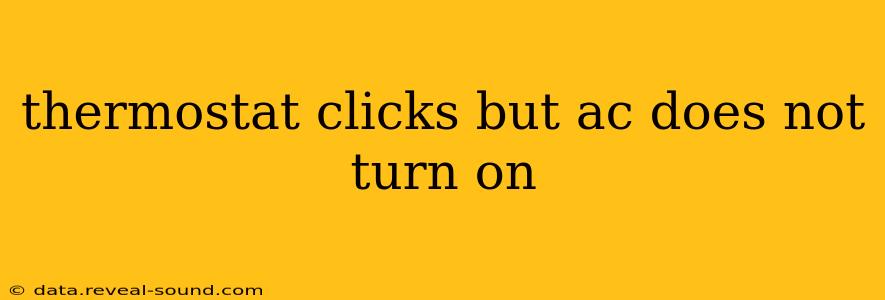Is your thermostat clicking, promising a cool respite from the summer heat, but your air conditioner remains stubbornly silent? This frustrating issue can stem from several sources, and diagnosing the problem is key to restoring comfort to your home. This comprehensive guide will walk you through the most common causes and solutions, helping you pinpoint the culprit and get your AC running smoothly again.
Why is My Thermostat Clicking But My AC Isn't Working?
This is the central question many homeowners face. The clicking sound usually indicates the thermostat is attempting to engage the AC system, but something is preventing the actual cooling cycle from starting. Let's explore the potential reasons behind this disconnect.
Could a Blown Fuse or Tripped Breaker Be the Culprit?
One of the simplest, yet often overlooked, causes is a blown fuse or tripped circuit breaker. Your air conditioner runs on significant power, and a surge or overload can trip the breaker or blow a fuse. Check your electrical panel for any tripped breakers (switches in the "off" position) or blown fuses (showing a broken filament). Reset the breaker by switching it off and then back on, or replace the blown fuse with a fuse of the same amperage. If the problem persists after this check, the issue lies elsewhere.
Is the Problem with the AC Unit Itself?
Even with power reaching the system, the problem could be within the AC unit itself. Several components can fail, preventing the compressor from starting.
What if the Condenser Fan Motor Isn't Working?
The condenser fan is vital for dissipating heat from the refrigerant. If this fan isn't spinning, the system will likely shut down to prevent overheating. Inspect the fan visually; if it's not turning, you might need a professional to check the motor or capacitor. Don't attempt repairs yourself unless you are qualified and comfortable working with electrical components.
Could the Compressor Be the Issue?
The compressor is the heart of your AC system. It circulates the refrigerant, which is essential for cooling. A faulty compressor is a serious problem that usually requires professional repair or replacement. If you hear clicking from the compressor itself (a distinct sound separate from the thermostat click), it's a strong indication of a compressor issue and you should call an HVAC technician immediately.
Is There a Refrigerant Leak?
A refrigerant leak can lead to poor cooling or a complete failure to start. This is a serious issue and requires professional diagnosis and repair due to the environmentally sensitive nature of refrigerant. Low refrigerant levels will often trigger safety mechanisms in your AC unit, preventing operation.
What About the Thermostat Itself?
While the thermostat is clicking, it doesn't necessarily mean it's functioning correctly.
Is the Thermostat Properly Wired?
Incorrect wiring can prevent the thermostat from properly signaling the AC unit. If you're comfortable working with wiring, double-check the connections to ensure they match the wiring diagram on the thermostat. However, if you're unsure, it's best to call a qualified HVAC technician to avoid potential electrical hazards.
Could the Thermostat Be Faulty?
A malfunctioning thermostat can be the source of the problem. Sometimes, a simple replacement can solve the issue. Before replacing it, try a simple test. Turn the thermostat up or down significantly and see if there's any change in the cooling (or heating if it's a heat pump). If nothing changes, the thermostat may be faulty.
When Should I Call an HVAC Technician?
If you've checked fuses, breakers, and performed basic visual checks, and your AC still isn't working, it's time to call a professional HVAC technician. They possess the expertise and tools to diagnose more complex problems, such as:
- Refrigerant leaks: These require specialized equipment and proper handling.
- Compressor issues: Compressor repairs can be costly, so a professional assessment is crucial.
- Electrical problems: Improperly handling electrical components can be dangerous.
Ignoring AC problems can lead to further damage and increased repair costs in the long run.
By systematically checking these potential issues, you'll be well on your way to identifying the reason your thermostat clicks but your AC doesn't turn on. Remember, safety is paramount, so if you’re unsure about any step, call a qualified professional.
